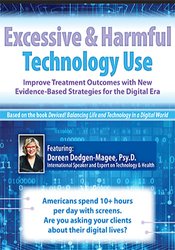

The modern digital world has presented a daunting therapeutic challenge. Technology is in your clients’ hands, and they’re using it daily to interact with the world.
The negative effects of technology overuse are impacting your clients like never before: lower self-esteem, social isolation, emotional dysregulation, the inability to focus or delay gratification, and sexual dysfunction. Even more alarming, growing evidence shows that specific forms of technology use are correlated with anxiety, depression, narcissism, violence and relational aggression.
The average American spends over ten hours per day with screens. If you aren’t asking your clients about their technology use, you’re missing out on a huge portion of their lives.
Watch and discover how to immediately transform your practice with:
Purchase today to help your clients reduce harmful technology use and greatly improve presenting issues of any diagnosis!
| File type | File name | Number of pages | |
|---|---|---|---|
| Manual - Excessive & Harmful Technology Use (3.3 MB) | 47 Pages | Available after Purchase |
Assessment of Technology Engagement & Effects
Please wait ...